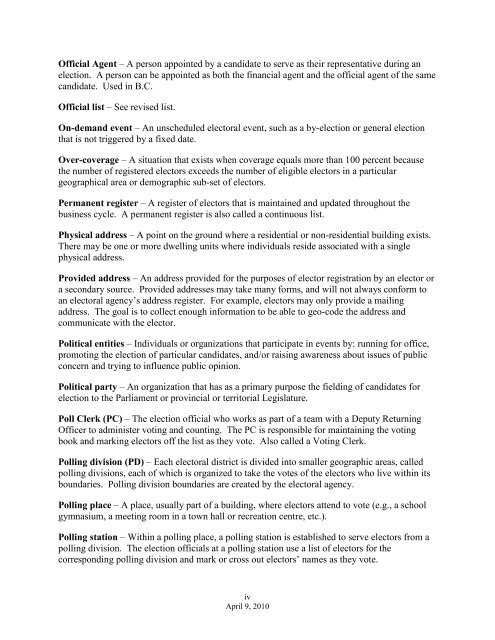Electoral-Management-Reference-Model-v.1.0
Electoral-Management-Reference-Model-v.1.0
Electoral-Management-Reference-Model-v.1.0
Create successful ePaper yourself
Turn your PDF publications into a flip-book with our unique Google optimized e-Paper software.
Official Agent – A person appointed by a candidate to serve as their representative during an<br />
election. A person can be appointed as both the financial agent and the official agent of the same<br />
candidate. Used in B.C.<br />
Official list – See revised list.<br />
On-demand event – An unscheduled electoral event, such as a by-election or general election<br />
that is not triggered by a fixed date.<br />
Over-coverage – A situation that exists when coverage equals more than 100 percent because<br />
the number of registered electors exceeds the number of eligible electors in a particular<br />
geographical area or demographic sub-set of electors.<br />
Permanent register – A register of electors that is maintained and updated throughout the<br />
business cycle. A permanent register is also called a continuous list.<br />
Physical address – A point on the ground where a residential or non-residential building exists.<br />
There may be one or more dwelling units where individuals reside associated with a single<br />
physical address.<br />
Provided address – An address provided for the purposes of elector registration by an elector or<br />
a secondary source. Provided addresses may take many forms, and will not always conform to<br />
an electoral agency’s address register. For example, electors may only provide a mailing<br />
address. The goal is to collect enough information to be able to geo-code the address and<br />
communicate with the elector.<br />
Political entities – Individuals or organizations that participate in events by: running for office,<br />
promoting the election of particular candidates, and/or raising awareness about issues of public<br />
concern and trying to influence public opinion.<br />
Political party – An organization that has as a primary purpose the fielding of candidates for<br />
election to the Parliament or provincial or territorial Legislature.<br />
Poll Clerk (PC) – The election official who works as part of a team with a Deputy Returning<br />
Officer to administer voting and counting. The PC is responsible for maintaining the voting<br />
book and marking electors off the list as they vote. Also called a Voting Clerk.<br />
Polling division (PD) – Each electoral district is divided into smaller geographic areas, called<br />
polling divisions, each of which is organized to take the votes of the electors who live within its<br />
boundaries. Polling division boundaries are created by the electoral agency.<br />
Polling place – A place, usually part of a building, where electors attend to vote (e.g., a school<br />
gymnasium, a meeting room in a town hall or recreation centre, etc.).<br />
Polling station – Within a polling place, a polling station is established to serve electors from a<br />
polling division. The election officials at a polling station use a list of electors for the<br />
corresponding polling division and mark or cross out electors’ names as they vote.<br />
iv<br />
April 9, 2010


